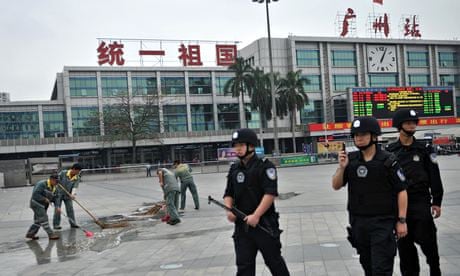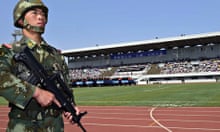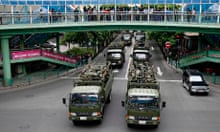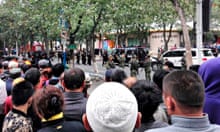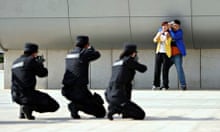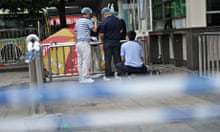Police in the southern Chinese city of Guangzhou have shot and wounded a man who knifed six travellers on Tuesday as the third high-profile railway station attack since March raised concerns of a growing security threat.
Two men and two women were being treated in hospital, but their injuries were not life-threatening, the state news agency Xinhua reported. The violence came less than a week after a knife and bomb attack at the railway station in Urumqi, the capital of the north-western region of Xinjiang, killed three and wounded 79.
In early March, five attackers with knives and machetes killed 29 people and injured more than 140 at a station in the south-western city of Kunming.
Officials have blamed both incidents on separatist terrorists from Xinjiang. Many of the region's Uighur Muslim minority resent religious and cultural controls and Han migration, and some seek an independent state, known as East Turkestan. While officials say separatists have stirred up trouble, exiles and rights groups say China's heavy-handed policies are the main cause of unrest.
While the region has seen repeated outbursts of violence in recent years, there had been no sign of problems there affecting other parts of China until October, when a Uighur man drove a car with his wife and mother into crowds at Tiananmen Square in Beijing. All three people in the car and two tourists died.
Tuesday's attacker struck at 11.30am in front of the station, as passengers were exiting the building, state media reported. The incident happened less than 50 metres from a police station.
The male suspect was being treated in hospital, Xinhua said, citing Guangzhou police. He was not carrying an identity card and his identity has yet to be confirmed.
The area was back to normal by Tuesday night, though one armed policeman could be seen near the spot where the man struck and others wore helmets and bulletproof vests. A security guard carried a large U-shaped metal implement on the end of a long pole, of the kind given to guards to incapacitate attackers following previous stabbing incidents in China.
Small police carts drove back and forth, with one officer using his loudspeaker to urge people not to stand around in groups. Vendors said police had warned them not to stand and watch if any further incidents erupted, but run away immediately.
Official media initially said four men dressed in white shirts and hats struck, but state news agency Xinhua later quoted police as saying just one man was involved. They did not explain the discrepancy.
A man who works at a store nearby told the Guardian he came out when he heard the police rushing to the scene and saw four men he believed were attackers, all wearing round white hats.
A woman hawking hotel rooms said her niece had seen the suspect sitting calmly by a booth on the square for some time before he suddenly got up, walked to where passengers were leaving the barriers and began slashing at people.
Hu Zhong, a 70-year-old luggage handler, told the South China Morning Post: "Everyone was running for their lives, even leaving their luggage behind. I was very scared."
He said he saw a suspect knifing people on the left of the plaza and three men, also in white shirts and holding long knives, running away.
"The suspect was blocked by two policemen, but the police didn't approach him until they shot him twice in his chest ... A luggage handler tackled him before the police grabbed him," Hu added.
Police have yet to say whether they believe it was a terrorist incident. China has also seen knife attacks on random civilians by people with personal grievances in the past.
"The key question is whether it's a copy-cat attack or there's some sort of organised plan," said James Leibold of La Trobe University in Melbourne.
"My gut feeling is that it's more likely to be a copycat, but we will probably never know; the state is very reluctant to come forward with information. We just get very terse statements that the case has been solved."
He suggested the real danger for the state was "confidence among the Han Chinese community that the party-state can protect them and look after their personal security".
Leibold said the government was also concerned about a possible backlash against the Uighur community.
Magnus Ranstorp, a counter-terrorism expert at the Swedish National Defence College, said that the spate of attacks raised concerns that there might be more problems lying ahead.
"The problem is that terrorism, especially in countries like China, may have some direction but can be very atomised," he said.
He added that there was an opportunity for the West and China to work together.
"From the Chinese point of view, they don't want interference in their internal affairs. At the same time, the west may have some solutions to tackle this issue," he said.
But China would have to share more information, he said, or could not expect assistance from the West.
He cited the UK's role in cracking the November 17th movement in Greece. While patrols could help to deter or halt attacks, strong investigative skills were also needed, he said.
Speaking on a visit to Hong Kong, US assistant secretary of state for East Asian and Pacific affairs Daniel Russel expressed "horror, outrage and sympathy" at the attack.
"We oppose terrorism in all forms, and in those instances where the available information or the information shared by the Chinese authorities pointed to terrorism by a group or individual, we have condemned it as terrorism," he said.
China's domestic security chief, Meng Jianzhu, told officials on Tuesday that the government would launch "special operations against terrorism", Xinhua reported. It added that he said authorities would "deploy new technologies to detect and remove security threats", but did not elaborate.
Prior to the Guangzhou attack, an article in the state-run Global Times said police had prevented "several" suicide bombings before the Urumqi blast, citing an unnamed Xinjiang law enforcement official.
